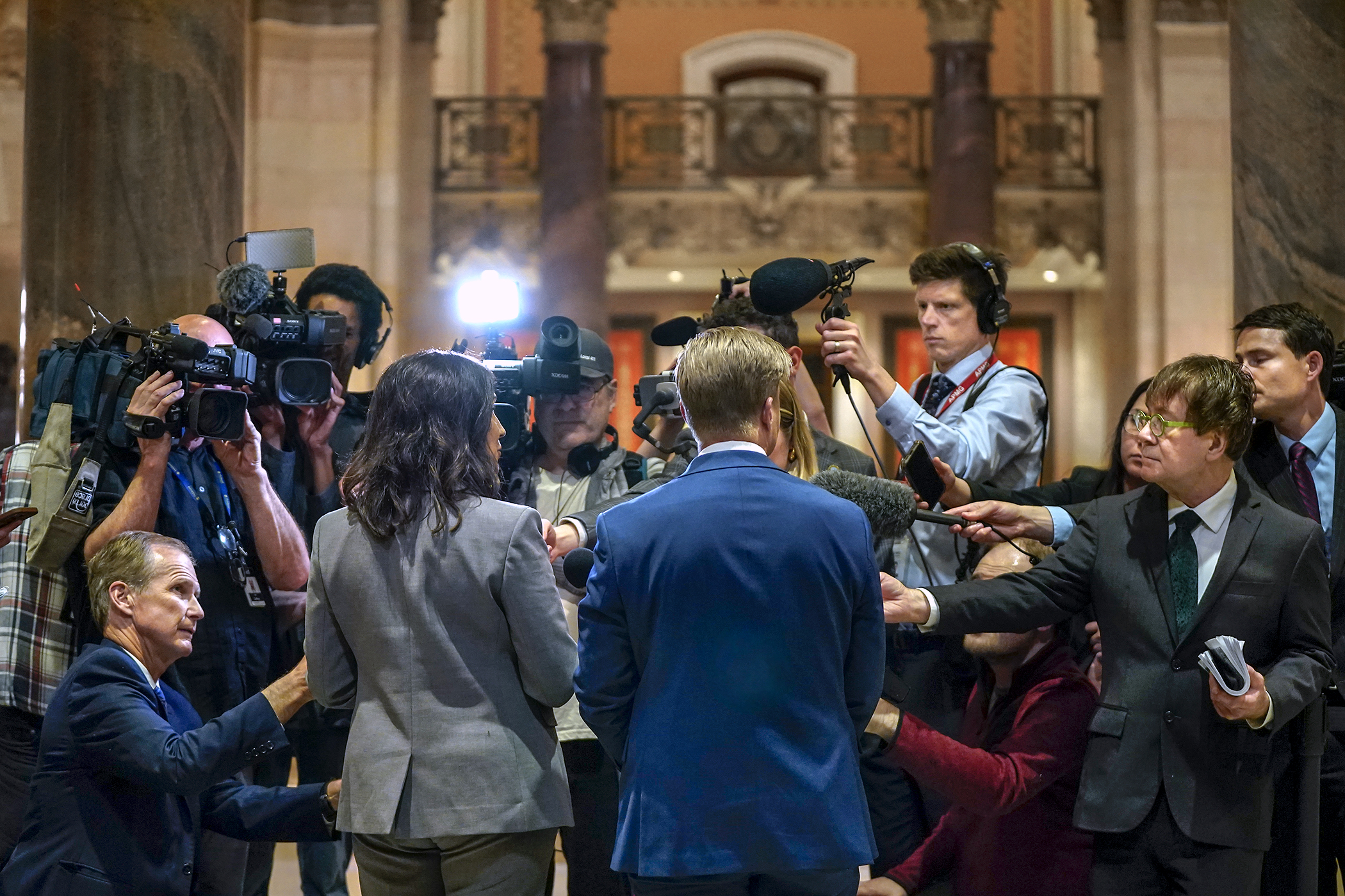Legislature — with budget incomplete — gavels out, prepares for special session

Some years, state legislative sessions surge to a climax on their final day, a flurry of activity providing a sustained adrenaline rush, culminating in smiles of satisfaction as a midnight deadline is met for completing the people’s business.
And then there are final days that fizzle. Such could be said of 2025’s constitutionally prescribed final day of Minnesota’s legislative session.
On Monday, some completed conference committee reports were passed by the House and sent to the Senate, but several more lay dormant, the committee co-chairs from the two chambers unable to reach agreement.
So it’s on to a special session, but how soon Gov. Tim Walz will call one remains to be seen. The timing is likely to hinge upon how far apart the various unconcluded conference committees are in crafting their final reports.
“We’ll continue to do the work, and when the work’s ready, I’ll bring them back for a one-day special session and we’ll button things up,” Walz said Monday afternoon before meeting with legislative leaders.
Walz warned that pushing the session beyond June 1 would mean state employees have to begin preparing for a possible government shutdown.
With the next fiscal biennium beginning on July 1, the Legislature must approve all budget bills and have them signed into law by the governor before midnight on June 30 to keep state government open for business.
Among the budget-based conference committee reports passed in both chambers on the Legislature’s final weekend were those providing funding to veterans’ programs, agriculture, housing, the judiciary and public safety, and programs supported by the Legacy Amendment.
On Monday, the House passed a bill governing pensions in the state and a set of human services policy provisions, both of which also received Senate approval and are on their way to the governor’s desk.
Between lengthy recesses, the House also approved a bill extending unemployment insurance benefits for workers let go in mass layoffs in the iron ore mining industry, but that bill was not taken up by the Senate.
And, as the session’s final hour approached, the House passed the conference committee report for state and local government and elections, which was approved in the Senate’s last vote of the session before adjournment. The House capped its session by choosing not to suspend House rules to consider SF856, which would create and fund a new state agency, the Office of the Inspector General.
What's next?
Speaker Emerita Melissa Hortman (DFL-Brooklyn Park) said legislative leaders and the governor have given all conference committees a deadline of 5 p.m. Wednesday to finish their work. She predicted the earliest a special session could start would be Friday, and urged conference committee chairs to focus on getting the budgeting portion of their bills fleshed out and to let go of any policy differences standing in the way of reaching agreement.
“The people of Minnesota deserve a budget,” Hortman said. “Our caucus is not going to be standing in the way of funding state government.”
Speaking after adjournment, House Speaker Lisa Demuth (R-Cold Spring) echoed Hortman’s assessment that working groups will meet Tuesday to try and complete their business this week.
“We have to finish this,” she said. “We will be able to get that work done in a bipartisan fashion. Hard decisions still have to be made, but we are ready to move things forward and get it done as quickly as possible for the people of Minnesota."
The to-do list
Still left unfinished are agreements that would set budgets for the next two biennia in the areas of commerce, education, energy, environment and natural resources, health, higher education, human services, labor and workforce development, and transportation.
And then there’s the tax bill, which would determine the how and how much of collecting revenue to fund all state programs. Neither the House nor the Senate had an omnibus tax bill voted upon by the time the two chambers adjourned Monday, although the House bill did make it to the floor last week before being tabled.
In an early stage of its legislative life is a bill for capital investment — known as a bonding bill — which would ascertain what infrastructure projects would be funded by state borrowing in the 2026-27 biennium.
— Session Daily writers Brian Basham, Margaret Stevens and Tim Walker contributed to this story.
Related Articles
Search Session Daily
Advanced Search OptionsPriority Dailies
Speaker Emerita Melissa Hortman, husband killed in attack
By HPIS Staff House Speaker Emerita Melissa Hortman (DFL-Brooklyn Park) and her husband, Mark, were fatally shot in their home early Saturday morning.
Gov. Tim Walz announced the news dur...
House Speaker Emerita Melissa Hortman (DFL-Brooklyn Park) and her husband, Mark, were fatally shot in their home early Saturday morning.
Gov. Tim Walz announced the news dur...
Lawmakers deliver budget bills to governor's desk in one-day special session
By Mike Cook About that talk of needing all 21 hours left in a legislative day to complete a special session?
House members were more than up to the challenge Monday. Beginning at 10 a.m...
About that talk of needing all 21 hours left in a legislative day to complete a special session?
House members were more than up to the challenge Monday. Beginning at 10 a.m...